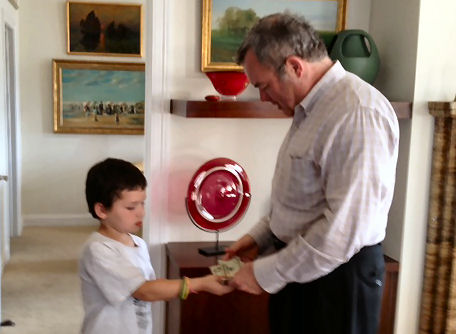I can’t imagine I am the only person who has bought Girl Scout cookies from parents, having never met or rarely seen their daughters. I just don’t get the point of this.
Is fundraising for a charity that one’s child is involved in about the money or is there a potential learning curve? I believe it is about both.
My grandson Freddy just turned 5. He is a kindergarten student and is involved in his first fundraising venture, a sponsored walk for his school. The child who raises the most money gets to throw a pie at the principal, which Freddy thinks is hysterical.
Freddy’s first idea was to ask his grandparents for money. Good move. We are the easiest touch in the world. Here, have a check. Want our car? How about a cookie? We are the obvious “low hanging fruit.”
But then we decided that his second ask should be our financial advisor. I called him and set up the appointment. Freddy’s phone skills are still a little shaky. Also, Freddy doesn’t keep his own calendar.
I set up an appointment for 4:30 with John Russell in his condo.
Before we went on the visit, I went over the most important questions that Freddy might need to answer:
1. What is the purpose of the request?
2. Why is it important?
3. What will happen if the funds aren’t raised?
4. How will the money be spent?
5. How much do you want to request?
Freddy said that the purpose of the walk was to raise money for his school, and that they needed the money for “stuff.” Also, if he raised the most money, he would get to throw a pie at the Principal. He also said that he was going to walk at the event. He said that he would ask for eleventy-two thousand and sixty three dollars. At age 5, I thought this was an interesting request and to go for it.
We got to John’s condo and Freddy started to explain the purpose of his visit. John asked him where money comes from and Freddy took at stab at explaining the banking system. John was dazzled with the amount that Freddy requested. John proposed that he would give him the number of dollars that represented the number of toes and fingers that Freddy had, but Freddy had to come up with the number. Freddy thought about it and said, “Twenty.” John said he would give Freddy $20. Freddy then said, “How about $22?” John acquiesced.
As a special treat for being such a great solicitor, John showed Freddy his spare glass eye. Freddy was so thrilled that John took out the one he was wearing, much to Freddy’s delight and entertainment.
What did Freddy learn? The most important thing any child learns is that they have the power to make a difference. He also learned that a first request is sometimes a “no” because the amount might be wrong, in some way. And he learned that you can counter with another suggestion. He learned about preparation and he learned about the banking system and prosthetic eyes.
When we left, he didn’t walk out. He strutted.

I need CAROL to…
Pages
- Articles About Fundraising
- 2 Minute Feasibility Study
- 5 Ways to Guarantee Your Development Staff Leave in Under Two Years
- A Great Auction Idea
- All About the Cold Hard Facts
- Ask For What You Want
- Donor Stewardship in The Year of the Plague
- Giving Societies
- High-Tech Fundraising
- Mission Trips: Mission, Mingling and Money
- Naming Opportunities… How Much and For How Long?
- The 7th Child
- The Champion Approach to Planned Giving
- The Pin and the Grammar Symbol
- Touring for Dollars
- When Your Child Has a Fundraising Project
- Blog
- Fundraising
- Fundraising Coaching
- Fundraising Plans
- Fundraising Retreats
- Fundraising Speaking
- Fundraising Webinars
- Home
- Planned Giving
- Volunteer Topics






